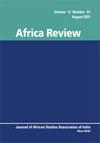Illegal street vending and national security in Harare, Zimbabwe
IF 0.5
Q4 AREA STUDIES
引用次数: 9
Abstract
ABSTRACT The purpose of this article is to examine the link between political and socio-economic dynamics of illegal street vending and national security in Zimbabwe using the case of Harare. Scholarship has increasingly focused on the interface between the urban informal economy and politics in Zimbabwe. However, the nexus between illegal street vending and national security emerges as a major gulf which this article attempts to fill. Using the human security concept as its framework for analysis and relying on data collected through focus group discussions, observations and interviews with street vendors and different officials as well as content analysis, the article argues that the illegal street vending’s negative effects on human security threaten national security. On the whole, the negative effects of illegal street vending that have the potential to prompt national insecurity include lawlessness, environmental pollution and public health hazards as well as, though arguable, providing a ready recruiting ground for violent mass protests which attract the attendant police violence thus generating social unrest. The article concludes that the deterioration of human security conditions due to illegal street vending endangers national security.津巴布韦首都哈拉雷的非法街头贩卖与国家安全
本文旨在以哈拉雷为例,探讨津巴布韦非法街头贩卖与国家安全的政治和社会经济动态之间的联系。学术界越来越关注津巴布韦城市非正规经济与政治之间的关系。然而,非法街头贩卖与国家安全之间的关系成为本文试图填补的一个主要鸿沟。本文以人的安全概念为分析框架,通过焦点小组讨论、对摊贩和不同官员的观察和访谈以及内容分析等收集的数据,认为非法摊贩对人的安全的负面影响威胁着国家安全。总的来说,非法街头贩卖有可能造成国家不安全的负面影响,包括无法无天、环境污染和公共健康危害,以及(尽管有争议)为大规模暴力抗议活动提供了现成的温床,这些抗议活动吸引随之而来的警察暴力,从而造成社会动荡。文章的结论是,由于非法街头贩卖导致的人类安全状况恶化危及国家安全。
本文章由计算机程序翻译,如有差异,请以英文原文为准。
求助全文
约1分钟内获得全文
求助全文
来源期刊

Africa Review
AREA STUDIES-
CiteScore
1.80
自引率
12.50%
发文量
22
期刊介绍:
Africa Review is an interdisciplinary academic journal of the African Studies Association of India (ASA India) and focuses on theoretical, historical, literary and developmental enquiries related to African affairs. The central aim of the journal is to promote a scholarly understanding of developments and change in Africa, publishing both original scholarship on developments in individual countries as well as comparative analyses examining the wider region. The journal serves the full spectrum of social science disciplinary communities, including anthropology, archaeology, history, law, sociology, demography, development studies, economics, education, gender studies, industrial relations, literature, politics and urban studies.
 求助内容:
求助内容: 应助结果提醒方式:
应助结果提醒方式:


